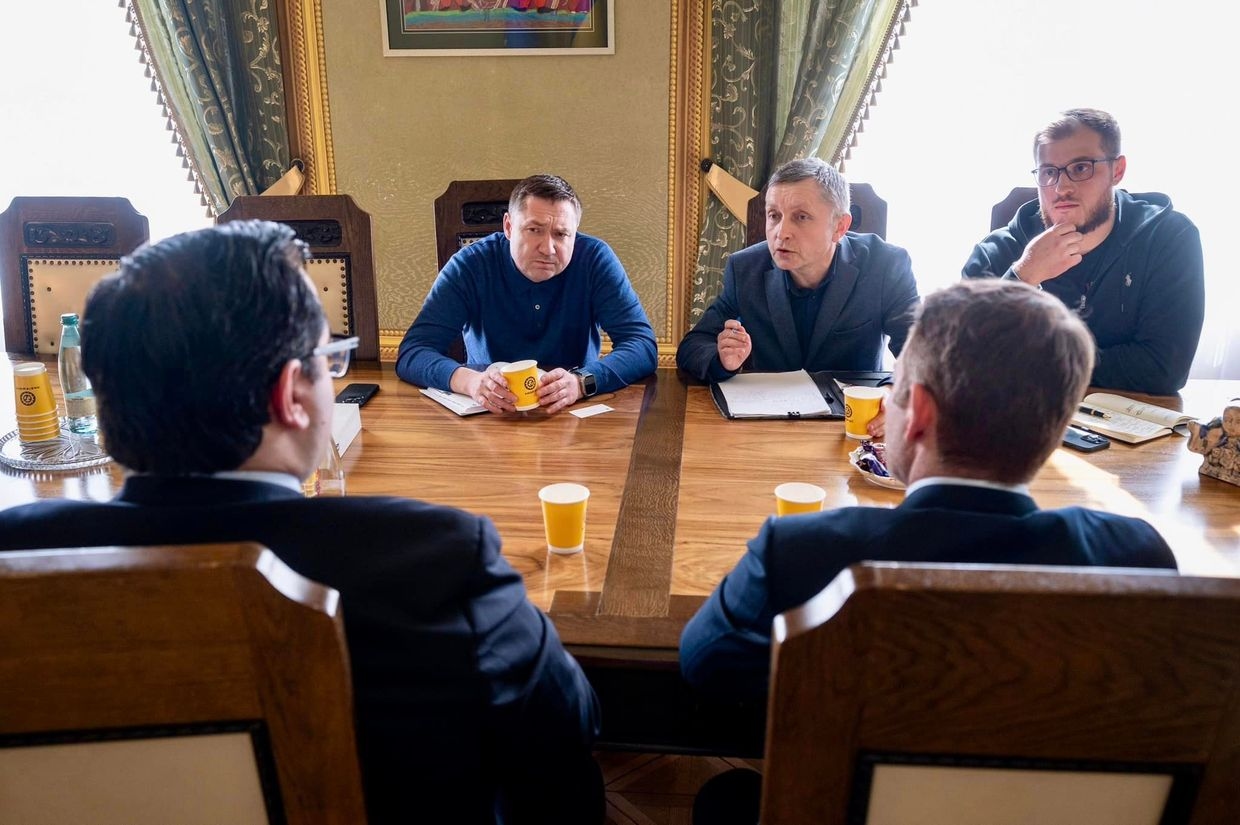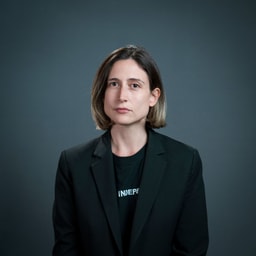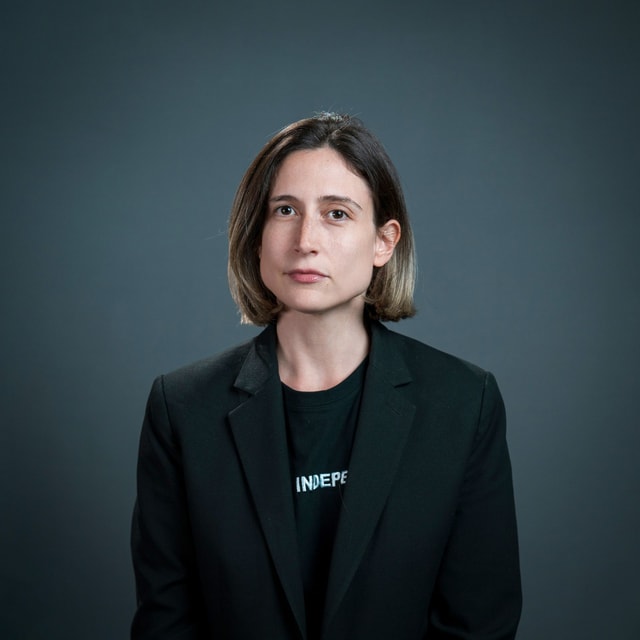Ukraine Business Roundup — A tale of two cities

The following is the May 21, 2024 edition of our Ukraine Business Roundup weekly newsletter. To get the biggest news in business and tech from Ukraine directly in your inbox, subscribe here.
One of the more-talked-about stories in Ukrainian business this past week was a seemingly odd government decision to exempt some workers at a few big-name companies from conscription.
What went down? Last month, the Economy Ministry decided a group of companies, which included the popular online gambling site Favbet, food delivery app Glovo, and Visa, could set aside a number of employees who they feel are too valuable to lose to mobilization.
The government allows some companies to “reserve” certain employees to ensure companies can stay up and running, and continue paying taxes to a starving state budget.
The public reaction was fierce: How could the government excuse people from military service from companies that aren’t essential, people wondered. The public was quick to point out that only one company on the list had anything to do with the military.
Digital Transformation Minister Mykhailo Fedorov had his own reply: The 54 people the companies requested exemptions for “weren’t couriers or gamers, but top-level IT specialists, engineers, and developers.”
The minister reminded everyone in a post on Facebook how “essential” IT workers are to Ukraine’s economy: The sector contributes nearly 5% of the country’s GDP and last year paid Hr 20.8 billion ($522 million) in taxes to the state budget, up Hr 3.1 billion ($77.8 million) from last year.
"One IT specialist working creates and maintains almost three jobs in the economy," he wrote, adding that while more than 300,000 employees work in the sector, only 1.5% are exempt from military service.
After canceling the exemption, the Economy Ministry said it would “analyze the decision regarding each company separately.”

Brave investors
Russian drones and missiles aren’t enough to deter some foreigners from opening businesses in Ukraine — foreigners have opened 2,652 companies here since February 2022, according to Opendatabot, a Ukrainian analytics service.
Turkish businesspeople made up the largest share of foreign businesses that have opened up since 2022, registering 354 new businesses. Uzbek citizens opened up 274 businesses, while Poles opened up 193.
The U.S., Kazakhstan, Germany, Azerbaijan, Israel, and the U.K. also ranked high.
The biggest players? At the top of the list was an Armenian-owned company called TENS1MA with a charter capital of Hr 1.28 billion ($32.5 million). The company, registered in Odesa, is involved in construction.
In second place was the Yugen investment fund, owned by American billionaire and philanthropist Dell Loy Hansen with a charter capital of $18 million.
Hansen’s Wasatch Group announced last year plans to build 600 modular homes for internally displaced people in Ukraine. Yugen Invest is currently developing luxury cottages in Ukraine’s western Carpathian mountains.
In third place is a Polish-owned company registered under the name LFS in Lviv with a charter capital of Hr 300 million ($7.6 million) that is involved in food and tobacco product wholesale.
Have you opened a business in Ukraine since the start of the full-scale invasion? We’d love to hear from you. Send me an email at l.bivings@kyivindependent.com.

Kharkiv
As Russian troops push into Kharkiv Oblast, attacks on the city of Kharkiv are daily and constant. The city’s energy generation is practically destroyed with generators picking up the slack.
The survival of Kharkiv’s businesses is of great concern. As Ukraine’s second-largest city, it makes up 3% of the country’s GDP. The city and its region’s industries include heavy industry, machine building, agriculture, IT, and publishing.
How is business in the city? Surprisingly perhaps, the biggest issue facing businesses in Kharkiv isn’t Russian attacks or power outages, but mobilization and local bureaucracy, according to business representatives who spoke at an event on business in Kharkiv held by the Kyiv-based Center for Economic Strategy last week.
Companies are hard-pressed to find people who want to work officially, as people look to avoid being seen by the state, and thus avoid conscription, Ihor Humennyi, president of the business holding UBC Group said at the event.
And with only highly skilled (and higher paid) employees being eligible for conscription exemption, companies are worried about retention.
And then there’s the issue that companies can’t send their male employees abroad as men of conscription age can’t leave the country. This puts particular strain on IT companies in Kharkiv, whose clients are 95% located abroad.
“We cannot sign contracts if the client does not see us,” Olha Shapoval, executive director of Kharkiv IT Cluster, said.
Despite it all, the city’s businesses keep going. Last year, the Kharkiv-based Ranok Publishing House printed 4.2 million books, 150,000 of which were exported. It also signed a contract with Disney to publish Star Wars books in Ukraine, its director said at the event.

Lviv
All the way on the other side of the country from Kharkiv — 1,087 kilometers to be exact — is the western city of Lviv, that held a tourism summit last week to promote the city.
Tourism to a war-torn country? Rumors have swirled that the city’s airport will be the first to open since the start of the full-scale invasion. Lviv Oblast Governor Maksym Kozytskyi made the case for his airport to be the pick of the litter.
"It is important for us to open the airport. At every international meeting, we emphasize that the opening of the airport means, on the one hand, that the sky over Ukraine would have to be closed. On the other hand, it is a huge opportunity for an international investor, a foreign tourist to see Ukraine," he said during the summit.
Naturally, hotel owners in the nearby Carpathian mountains agree, saying that reopening the airport will revive the tourism industry, the Lviv outlet Vysoky Zamok reported.
On the sidelines of the summit, Kozytskyi met with the American investment company Chicago Atlantic Trident, who is considering investing in building affordable housing in the Lviv region.
The real estate business in Lviv Oblast isn’t a bad choice. The region has accepted the largest number of internally displaced people, having added somewhere between 240,000-350,000 people since the start of the full-scale invasion. That’s a lot of demand.
Rents in the region are rising, and are now the highest in the country, according to the State Statistics Service. Lviv Oblast topped recent ratings with an average rental price of a one-bedroom apartment Hr 11,914 ($299) in April 2024, a 1.1% increase from December 2023.

The business of embroidery
Every year on the third Thursday of May, Ukrainians celebrate Vyshyvanka Day. Our office celebrated it last week (see the picture above — I’m the first one from the right in the front row).
If you aren’t familiar with a vyshyvanka, it’s the Ukrainian word for an embroidered shirt or dress – a central piece to traditional Ukrainian clothing. They’re centuries old, but have made a comeback.
In fact, the number of offers on Ukraine’s popular online marketplace OLX selling vyshyvankas has increased 28 times since 2020, according to OLX data requested by Liga.net. In 2022, responses to offers on OLX hit 70,000, double the year before. In 2023, responses hit 230,000.
Why are they becoming so popular? As the saying goes, no one did more to consolidate the Ukrainian identity than Russian President Vladimir Putin. The war has led to a cultural revival of sorts as Ukrainians look for a way to distance themselves from Russia.
Many of us in the photo are wearing vyshyvankas from the incredibly popular brand Etnodim that has a special knack for making the medieval modern. Guess what? They have international shipping. Check them out here.
What else is happening
Minister: Ukraine exported agricultural products worth $22 billion in 2023
Ukraine harvested 80 million tons of grain and seed oil products last year and exported agricultural goods worth $22 billion, Deputy Agriculture Minister Taras Vysotskyi announced on May 16. According to Vysotskyi, 87% of all agricultural products are being exported from Odesa and adjacent ports.
Politico: EU, Ukraine push for membership talks to start on June 25
Officials from the EU and Ukraine are pushing to begin formal accession negotiations as early as June 25, Politico reported on May 21, citing its undisclosed sources. According to the news outlet, intense diplomacy is being undertaken aimed at convincing the Hungarian government to drop its objections to Kyiv's membership in the bloc.
EU Council approves using Russian assets revenue to fund Ukraine
The EU Council agreed to use profits from the frozen Russian sovereign assets to aid Ukraine, the Czech representation in the EU announced on May 21. According to the statement, the proceedings could amount to between 2.5 billion and 3 billion euros ($2.7-3.26 billion) annually, with most of it allocated to Kyiv's military needs.
Ukrainian banks increase profits in first quarter despite higher taxes
In the first quarter of 2024, Ukrainian banks earned Hr 40.5 billion ($1 billion), according to the data analytics service Opendatabot. Despite an increase in taxes, this is 19% more than in the same period last year. At the end of last year, the government passed a law taxing banks at a rate of 50% for excess profits in 2023. In 2024, the basic income tax for banks was raised to 25% from 18%.
Media: Ukrainian coal businessman Kropachov detained
Businessman Vitaliy Kropachov is the owner of the Ukrdoninvest Group of companies with assets in the coal industry, machine-building, construction, transportation, and media. The businessman is suspected of fraud in the coal sector, Ekonomichna Pravda reported, citing unnamed law enforcement sources.
Company news
Vodafone Ukraine's revenue in the first quarter of 2024 increases by 13% to Hr 5.76 billion ($144.6 million). The growth was mainly due to an increase in the use of data services and number of users in both mobile and fixed communications, the company, Ukraine’s second largest mobile operator,said in a press release.
Naftogaz has launched seven new gas wells since the start of 2024. Last year, the company, Ukraine’s gas and oil giant, launched 86 new wells, Prime Minister Denys Shmyhal said on May 17. The goal for 2024 for Naftogaz is to reach production of about 15 billion cubic meters of gas this year, he said.
DTEK: Ukraine actively seeking financial partnerships with Saudi Arabia to diversify its economy. Maxim Timchenko, CEO of Ukraine’s largest private energy company DTEK, told Arab News in an interview that Ukraine has held high-level government talks with the Public Investment Fund and other Saudi institutions regarding capital deployment to Ukraine.










